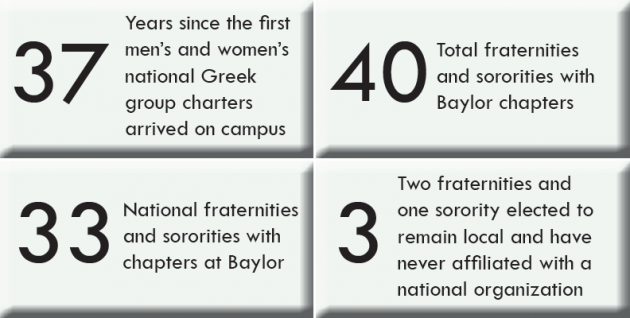In 1976, many groups made move to national affiliation
By Linda Wilkins
Staff Writer
Baylor Greek Life has changed substantially since its early days, with national affiliations providing opportunities for networking and growth.
Becoming part of a national Greek organization was a big decision for many local organizations on campus in the 1976-1977 school year, when national Greek organizations came to Baylor and made presentations about their groups.
The local organizations voted on whether to join a national organization. If they wanted to be affiliated with one, they petitioned for a charter from the national organization and Baylor, Tommye Lou Davis, vice president for constituent engagement at Baylor, said. This shift toward national affiliations was a theme in universities and colleges across the nation, she said.
For many groups, networking was a big factor in their choice to affiliate with a national group, Davis said, because being national provides a connection to other universities across America.
Davis was also a member of a local organization when she was a student at Baylor. After she graduated, many of the local organizations went national and offered to initiate the alumni of the local organizations into the national groups. Hundreds of alumni returned to be initiated, Davis said, and she was one of those who returned.
Kathy Hillman, faculty advisor to Delta Delta Delta and the director and associate professor of the Special Collections for Central Baylor University Libraries, has also seen Greek Life grow and change at Baylor.
When she was a student here, Hillman participated in and was an officer of a local organization called Kappa Theta, which later became affiliated with Delta Delta Delta. She was a faculty member at Baylor when the local organizations affiliated with national Greek organizations.
Initially, many local organizations were not excited about transferring to a national organization, but they understood how networking was possible through being part of a national group, Hillman said.
Local organizations in the 1970s also had their drawbacks, she said. They didn’t have enough accountability and there was not much oversight of their calendars — the groups did not know where to go or what to do, she said.
“Being national provides that [accountability],” Hillman said.
The Greek organizations now encompass 25 percent of the student population, Hillman said.
Kappa Alpha Theta was the first national Greek women’s group to have a charter on campus, Dr. Martha Lou Scott, associate vice president for Student Life, said. Sigma Omega Sigma (a local organization on campus) was the first national men’s group to form as a Greek organization in 1975, becoming Tau Kappa Epsilon.
Some local organizations chose to remain local, however, such as Baylor’s oldest men’s social club of the time, Esquire, and The Chi’s Women’s Service Club.
The university was involved in the process of organizations going national in order to ensure the newly formed organizations begun on campus could enhance Baylor instead of being detrimental, Scott said.
“Baylor was very intentional about who they brought to campus,” Scott said. “They had to keep with the overall mission statement of the university.”
Since transitioning to national organizations, the Greek groups have become more focused on helping their members and volunteering for others, Scott said.
“All the organizations have been fortunate,” she said. “They’ve had tremendous support on-campus and off-campus.”
Not all the Greek organizations that were chartered at Baylor are still in existence today, however, Davis said. Because of poor numbers or financial reasons, some groups have had to disaffiliate with the campus, she said. Davis said Sigma Kappa is one example of a group that is no longer on campus because there were not enough people involved with the group to keep the group’s charter.
Campus charter violations can also cause organizations to lose their charters. After various violations, Baylor’s chapter of Sigma Chi lost its charter in 2010.
Most of the problems that arise from Greek life stem from someone breaking a rule, Scott said.
“We create those [problems] ourselves,” Scott said. “We, as people, don’t follow the rules.”
Through the years at Baylor, Scott said, the Greek organizations have evolved from being literary societies and clubs to groups that provide students with skills they can use in the future.
Today, Greek life offers students opportunities to participate in leadership, Bible studies, sports, volunteering and philanthropy, and opportunities to receive academic support, Scott said.
When comparing today’s national chapters on campus to when they first formed, the organizations have matured and become more focused on leadership and positive programming, Hillman said.
The sororities help prepare women for their careers by emphasizing characteristics such as social development, Hillman said.
The Greek groups are also more attuned to philanthropy for a specific organization or cause, such as St. Jude Children’s Research Hospital or Susan G. Komen for the Cure, than they were in the past, Hillman said.
Today, Greek life encompasses five different types of organizations.
One group is the National Pan-Hellenic Council (NPHC) which encompasses seven of the historically African American fraternities and sororities chartered at Baylor.
The Interfraternity Council (IFC) encompasses the 12 nationally affiliated fraternities on Baylor campus.
Eight social sororities are members of the Panhellenic Council at Baylor, which focuses on spiritual, social and intellectual development.
There are some local organizations on campus, including Kappa Chi Alpha, Kappa Omega Tau and Phi Kappa Chi. These local organizations are not connected to a national group.
There are four independent national organizations on campus. Beta Kappa Gamma, Beta Upsilon Chi, Delta Kappa Delta and Sigma Phi Lambda do not hold membership in any of the four Baylor Greek organizations.
The Multicultural Greek Council was created to encourage community service, academics and diversity. Two fraternities and six sororities are in the MGC.






